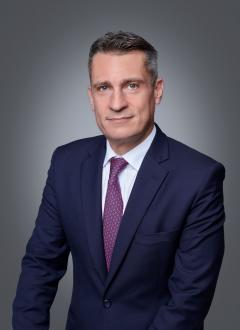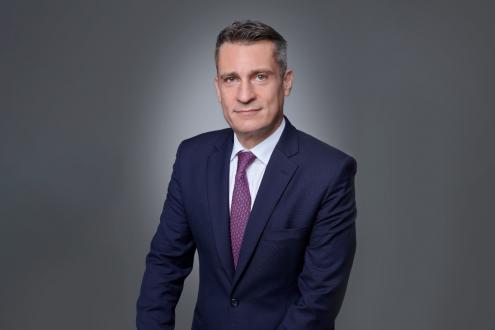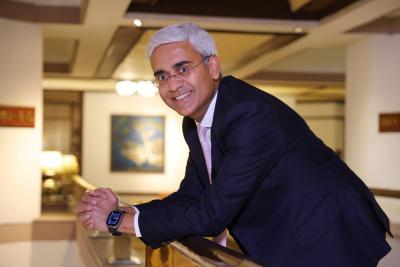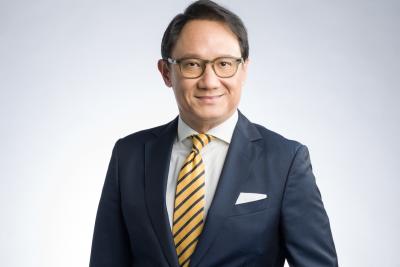Lombard Odier’s CEO for Asia on the Importance of Focus and Consistency

Vincent Magnenat of Lombard Odier
Oct 30, 2020
Vincent Magnenat is a private banking leader in Asia with a robust strategy for expanding the bank’s presence onshore and offshore across the region. In his role as Limited Partner and CEO for Asia at Swiss private bank Lombard Odier, a 224-year old, privately-owned family business for seven generations, Magnenat is building the bank’s presence in the region based on three core themes, namely technology, sustainability and a new approach to investing. He met again recently with Hubbis to provide an update on how, despite the challenges of the pandemic, the bank is achieving this vision, and to express his optimism for the future, as Asia’s wealth private clients adopt an increasingly sustainable and multi-generational outlook, while also warming increasingly to the active, discretionary and advisory models.
Lombard Odier today has two value propositions in the region: the high net worth family services practice, and investment services. In both of these areas, the bank is expanding its presence across the region, both through its own offices in Singapore, Hong Kong and Tokyo, as well as through its growing array of high-quality onshore strategic alliances, which now include markets such as Thailand, the Philippines, Indonesia, Taiwan and Australia.
These two value propositions are founded on four key pillars. The first is the expansion in both numbers and quality of the three private banking office operations. The second is an expansion of the onshore private banking proposition through its regional partnerships. The third pillar is external asset management. And the fourth pillar is building more discretionary portfolio mandates (“DPM”), which have been taken up by nearly half of Lombard Odier’s clients, versus an industry average of closer to just 5-10%.
Toughing it out
Magnenat opens the discussion by commenting on how difficult a year 2020 has been and how until today nobody knows the full impact of the pandemic on all walks of business and life as we know it.
“Adaptability is the key,” he comments, “and from that perspective, Asia’s control of this pandemic has been tight, with seemingly the right measures taken. For Lombard Odier, we have survived successfully for over 224 years and through over 40 major financial crises. Being part of an organisation that remains a family business, in its seventh generation, with extremely strong values and with an approach that is truly long term, puts us in a remarkably robust position to support our clients through storms such as these.”
Ready for the challenges
He adds that in his view, the bank’s business model works extremely well in the current environment.
“We are aligned with our clients,” he says, “and are frequently on calls with them – sometimes we have video calls with our clients in the comfort and security of their homes, which offers a type of intimacy and a doorway for a depth of discussions that perhaps we seldom would have had with our clients pre-pandemic. There is anxiety out there, of course, but clients are seeing the values of solidarity and engagement, meaning we have extremely good discussions, and in fact a deepening of our already strong relationships for the future.”
Balance is essential
Magnenat elucidates his view of Lombard Odier in the marketplace, commenting that as a boutique private bank, the bank’s credo is to adopt a highly bespoke approach. “We take a multi-generational approach, that means we are their partner over generations – we advise on building a legacy and providing our bespoke investment expertise. We are constantly engaging with our clients, making sure that we have the time for our clients, and that we are attuned to them on both a business and personal sense. And at a time like what we are all facing in 2020, these virtues are even more important and valued. This of course also helps us with our stewardship of the investments of our clients, as we really aim to understand their needs, and strike a balance between taking risks and ensuring that clients get a good nights’ sleep without the fear of losing out on opportunities in the market.”
He cited the example of a recent survey the bank recently conducted with UHNW clients in the region, one also in collaboration with the bank’s strategic alliances in the region, including Thailand’s Kasikornbank, UnionBank of the Philippines, Indonesia’s Bank Mandiri, Taipei Fubon Bank as well Mizuho Securities (Singapore), The survey served as an opportunity for Lombard discuss issues and themes that are close to the hearts of UHNWIs in the region.
Three core trends
“Three key trends that we have gleaned from our conversations with our clients are regarding technology, sustainability, and investment,” he reports. “Technology of course has been a remarkable enabler of our ongoing communications with clients, and I personally feel that this revolution in communication will endure well beyond the pandemic, as a means of optimising our interactions. For us, technology is far more than a simple catalyst in the evolution of new ways of communicating, it is a key pillar of our business model, and built a tech platform and digital user experience that is perhaps the best in the industry. In an increasingly competitive market, the winners will be those who can identify the optimal balance between traditional approaches and secure cutting-edge technology to give clients what they demand.”
He elaborates on these comments, noting that Lombard Odier has been one of the pioneers to develop technology in private banking, starting on this journey over 25 years ago.
“Lombard Odier has a long-standing strategic approach to remain at the forefront of technological developments by investing heavily in its own proprietary banking technology and by integrating client-centric digital solutions,” he reports. “We also provide our industry-leading banking technology as a service to other financial institutions, and in fact, aside from our bank, we have ten clients on our platform. Technology, as we look at it, adds value and consistency and is very much part of our core strategy.”
Sustainability
“As to sustainability, the second key trend we identified, there were concerns that the momentum built up in 2018 and 2019 especially around sustainability, climate change and ESG might wither in face of the virus and its impacts, but the reality is completely different. The reality is that it remains a huge upwards trend. This revolution will be the biggest source of returns and risks in the coming years; investing the right way in terms of sustainability and climate transition will be essential in the coming years.”
Adding further insights, Magnenat comments that the bank has been moving ahead of the game to some extent, focusing now on what the bank terms the ‘CLIC’ economy, a trademarked acronym standing for an economic model that is circular, lean, inclusive, and clean. “We believe that our focus on sustainability as a core conviction, together with our preference for high quality companies with excellent financial ratios and best-in-class ratings in our proprietary CAR (Consciousness, Action and Results), is both convincing and enduring,” he says.
“Very simply, we believe in creating a sustainable future – based on a CLIC economy; this will affect every single sector, creating a USD5.5 trillion investment opportunity annually. Our priority is to meet our clients’ long-term investment objectives while fostering the adoption of economic models that are fully consistent with the UN Sustainable Development Goals. It is our duty to help our clients mitigate the risks and capture the opportunities as the transition to a CLIC economy unfolds.”
Lombard Odier embraces carbon-reduction solution-providers as well as transition candidates from carbon-intensive, but economically-vital sectors. Focusing on an unadjusted carbon footprint can be misleading, which is why the bank focused on ‘additionality’ to identify carbon-intensive companies that avoid or capture carbon in other parts of the supply chain. Lombard Odier also look for companies that benefit from the need to adapt to an increasingly carbon-damaged world.
“Everything we're doing now, from an investment point of view, is really based on these premises,” he observes. “And our distinct feedback from our many discussions with clients in this region is that Asia is really becoming much more engaged in these matters. In fact, that interest in sustainability themes and behaviour is extremely high.”
He points also to the March launch of the bank’s climate transition strategy, remarking that this is one of the most important investment strategies the firm has launched. “Although coming out in March at the height of market volatility, it reached a volume of USD300 million despite the market challenges then,” he reports. “Investors remain convinced of the strength of our climate strategy and our ability to deliver superior returns.”
He further highlights how Lombard Odier is the first bank to have signed the ETC (Energy Transition Commission), which on May 6th launched to promote a ‘green stimulus’ in response to the crisis.
In commenting on the rising Asia-wide interest in all these sustainability themes in investments, he adds that Lombard Odier is thoroughly engaged with multi-generational relationships with its clients and their families. “We know that the younger generations who will make or inherit trillions of dollars of Asia’s wealth are more naturally inclined to these ideas and practices, so this theme is going to be sustainable in itself,” he says. “However, the first generation or current generation of family members are also keen on hearing what we have to share, and are willing to adapt their strategies and business models further to strengthen their resilience and leave a lasting legacy for future generations.”
On the matter of the bank’s commitment to inter-generational relationships, he notes that Lee Wong continues her very considerable efforts to build out those relationships in the region. “And of course, the younger generations are more engaged in technology too,” he adds, “and therefore they link in neatly with all three of our core themes – tech, sustainability and new ways of investing – and new approaches to multi-asset strategies in both the public and private markets.”
Agile investing for the new world
And on this note, regarding the third key theme of investments, Magnenat comments that the global ‘bazooka’ responses from governments and central banks in combating the pandemic involved extremely low or even more negative rates, and that is likely to persist for some long time to come. Meanwhile, some portions of the markets, driven by technology, have performed very well. “But we need to look beyond and to the medium-term and long-term and envisage a new normal, and that means rethinking our historic approach to investing, including absorbing all these core elements of technology, sustainability, multi-assets, private markets as well as public and different norms of asset allocation,” he says.
He also addresses the notion that passive is past and active is the new way forward again. “I would say that we are definitely in sync with the active approach today, rather than passive, as we believe that we should be proactive and not reactive; to be selective rather than trying to track indices. DPM remains at the centre of our value proposition, because we believe, especially on the medium- and long-term investment that discretionary will add the value, especially our risk-based approach. Investment satellites that will either take more or less risk depending on conditions and the outlook are core to our bespoke investment approach with our clients.” Hubbis recently spoke with Lombard Odier’s Asia Chief Investment Officer for Asia on this as well.
Growing acceptance in Asia
On this front, Magnenat notes that there is increasing appetite and demand for the Lombard Odier’s risk-based approach. “We must cater to clients who have fear as their guiding light, and others who are much more optimistic, and it is really only by engaging with your clients as individuals that we can understand their positioning, tailor to their needs and expectations and adapt our strategies and advice accordingly. If you come with just one strategy, and you are really rigid, you might very well frustrate or disappoint them, so in this world we face, we need to be adaptable, sensitive and agile.”
Magnenat’s Key Priorities
He explains that one of his key missions is to build on the regional presence via strengthening its existing strategic alliances. “In Asia, we have offices in Singapore, Hong Kong, and Tokyo, and seeing the evolution of onshore wealth management, we really value our strategic alliances and friendships in this region. We have now expanded our presence in the region through our relationships with Thailand’s Kasikornbank, UnionBank of the Philippines, Indonesia’s Bank Mandiri, Taipei Fubon Bank, Australia’s JBWere as well Mizhuho Securities (Singapore), thereby serving ever more clients through our strategic alliances.”
He maintains that this is a two-way street, with local partners also benefitting significantly from the experience, solidity and reach of Lombard Odier. “In some ways, the crisis of 2020 has helped us cement these friendships,” he says, “as we have endured and overcome the challenges together. It has been an extremely positive experience working together, and we are excited to continue to support our strategic alliances going forward.”
Accordingly, he says his overriding priorities are to continue to serve clients in the best and most professional ways from the bank’s three offices in the region, as well as building up the client base and expertise regionally. “We challenged ourselves to get the best of everybody, and we plan to continue with our philosophy of investing to support our clients, their families, and their businesses through these times, and beyond. We strive to offer the best talent, the best services and the best wealth management to our offshore and onshore clients.”
True to the vision
“We remain true to the vision that we devised and elucidated some years ago and that we are putting into practice with commitment and dedication,” he reports. “All the elements of our activities here in Asia are maturing and expanding, and we are well-positioned to build for the future and to provide our clients with the best outcome for the services we provide.”
His final comment focuses on his personal hopes for the future. “I truly wish for more solidarity amongst people, and I hope for more empathy in this world of ours,” he says. “We at the bank and I try to follow the best examples, and if we can all pull together, we will all win through.”
Getting Personal with Vincent Magnenat
Lombard Odier's Asia Pacific CEO, Vincent Magnenat, has been heading the private bank's operation in Asia since 2013. When not immersed in what is a highly demanding and challenging role at the more than 200-year old Swiss private bank, Magnenat has a passion for cooking. Similar to his culinary skills, Magnenat’s role as CEO for the region demands that all the best ingredients are in place and perfectly assembled in order to achieve the best outcome.
He hails from Brienne in Switzerland and grew up near Lausanne. Early in his career, he took an apprenticeship with Winterthur Insurance, which in 1998 was bought by Credit Suisse. "I began with Credit Suisse with the wind in my sails," he recalls, "as they were very eager to expand into insurance. My career with them brought me to Singapore, which was an exciting and challenging step."
Some years later Magnenat was appointed a managing director at Societe Generale and in 2013 was headhunted into Lombard Odier as its Asia head of private banking. He was subsequently promoted to CEO of Asia Pacific and became a limited partner of the firm.
"I am a round peg in a round hole," says Magnenat. "This role represents a great opportunity, it suits my personality and my ambitions, and I am utterly committed to this business and building upon the bank's success in the region."
He says that not only is Lombard Odier a wonderful bank to work with, given the philosophy, longevity and global strategy, but it is also a remarkable opportunity to meet a lot of successful and interesting people.
Lombard Odier Group – Resilience through the Global Storms
Lombard Odier Group produced an encouraging set of results for the first half of 2020, reporting that client assets were resilient at CHF290 billion with strong new net money. Total client assets at end-June 2020 stood at CHF290 billion, down 3% from end-December 2019, but in the overall context of the pandemic and financial markets, this was a relatively resilient performance.
The Group reported operating income for the first six months of 2020 as CHF674 million, up 16% from a year earlier, driven by strong net new money flows and increased client activity in volatile markets. Consolidated net profit was at CHF119 million.
The Group’s balance sheet remains strong, highly liquid and conservatively invested, with no external debt and a strong CET1 ratio of 29.7% and liquidity coverage ratio of 238% at end-June 2020. Fitch reaffirmed the Group’s credit rating at AA- with a stable outlook in July 2020.
Lombard Odier commented in a release at the time that the focus on developing sustainable investments, and in-house alternative investment strategies had proven particularly useful at a time of heightened market volatility.
The bank stated the robustness of the Group’s proprietary banking platform had enabled it to stay close to clients and to provide seamless client service throughout the crisis. Lombard Odier said it would continue the significant investment in its proprietary technology for clients and third parties which have proven to be a key differentiator for Lombard Odier.
Sustainability is at the heart of Lombard Odier’s approach to its business and investment philosophy. As a leader in this field, the bank has continued to integrate sustainability across its institutional and private client portfolios, and continues to expand its range of sustainability-driven core conviction strategies, including via the successful launch of a new Climate Transition Fund in March.
In September this year, Lombard Odier and the University of Oxford announced a new multi-year partnership to foster research and teaching on sustainable finance and investment, with a particular focus on climate change, circular economy and nature.
The collaboration between Oxford University and Lombard Odier will provide a unique platform for knowledge exchange between scholarship and financial services and support sustainable finance, Lombard Odier said in a press release, thereby helping support sustainable finance in becoming a major field of academic research globally, and thereby harnessing the vast potential of the financial sector. The idea is that for sustainable finance to be itself sustainable, it needs greater academic rigour, as well as education to scale the adoption of best practices.
Hubert Keller, Managing Partner, Lombard Odier, said: “There are unprecedented investment opportunities associated with the global sustainability transition – towards a Circular, Lean, Inclusive and Clean Economy. We call this the ‘CLIC Economy’ and as a firm, we are at the very forefront of identifying and capturing these opportunities. Sustainability has always been at the heart of Lombard Odier’s approach to its business and investment philosophy and we are consistently investing in these capabilities. Through their unique and leading capabilities in sustainable finance, we are excited to be working with the University of Oxford with the objective to increase the impact of sustainable investments.

Limited Partner, Global Head of Strategic Alliances, Asia Regional Head at Lombard Odier
More from Vincent Magnenat, Lombard Odier
Latest Articles






